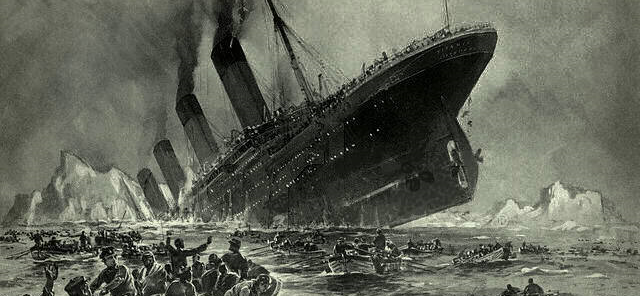Climate Change Morality and the Titanic: Preventing Disaster

Imagine that you could travel back in time with one chance to avert the sinking of the Titanic. Theologically, you could say, “Well, it must be God’s will for the Titanic to sink, so I will just let it sink, even if I have the needed knowledge to save everyone and even if I am going down with the ship as well.” From this vantage point, you could decide to muster a bit of hope and add, “I will certainly pray that God has a change of heart and saves us all.”
Alternatively, you could determine that this trip to the past is a divine ordained opportunity to serve as a vessel of God’s will and act rather than sit idly by as disaster occurs. The decision to act, however, is not the final decision to be made. You next must decide how to exercise your God-given agency. For example, you could decide to head straight to the lower compartments and frantically begin chewing gum in the hope of plugging up the first breach in the hull from the iceberg.
Or, you could pound on the captain’s door and demand that the course of the ship be changed to avoid the iceberg altogether. If the captain fails to heed your pleas, you could then organize a mutiny to take the necessary control of the ship and its steering.
Assumably, most rational people would pursue something along the lines of this last option. But if we turned this imagined scenario into an analogy for addressing climate change, how would we say most people are acting today? Undoubtedly, some are walking around on the ship’s deck in denial, while some are focused on other concerns altogether.
Yet, I dare say that many are focused on the equivalent of chewing gum to plug the hole because it seems more manageable and doable. It doesn’t require raising one’s voice or making a commotion that might upset others on the ship.
The gum wad approach is also the approach that
The key question today remains one of agency. How do we act with the urgency and scale required of us to effectively serve as God’s vessels in this moment? In a recent video, Bill McKibben contends that the Green New Deal is “the first legislation that is on the same scale as this crisis that we face.” Now is the time to determine how to best advance it as people of faith with the speed required. Time is running out, but we can still be agents of the divine when our collective action is needed most.
To learn more about what people of faith can do to mobilize for the Green New Deal, join a webinar featuring Varshini Prakash of the Sunrise Movement on July 11th.
Related News
Joy, Love, and Climate Action: A Church Draws from Ayana Elizabeth Johnson
At First Congregational Church, UCC, in Colorado Springs, CO, our Climate Justice Leadership...
Read MoreAn ally experiences PRIDE in the CLE
Advocacy and Action for Women's and Gender Justice Local events stir thoughts and...
Read MoreVote for Climate Hope Congregation Toolkit
After having witnessed the wonderful Climate Hope art of UCC children and youth, we are now...
Read More

